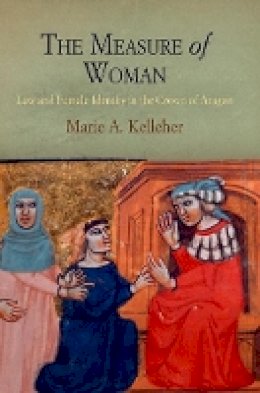
Stock image for illustration purposes only - book cover, edition or condition may vary.
The Measure of Woman: Law and Female Identity in the Crown of Aragon
Marie A. Kelleher
€ 76.95
FREE Delivery in Ireland
Description for The Measure of Woman: Law and Female Identity in the Crown of Aragon
Hardback. Drawing on hundreds of unpublished court records, Marie Kelleher examines how women in the fourteenth-century Crown of Aragon engaged with patriarchal assumptions to shape their own legal identities, thus playing a crucial role in the formation of a gendered legal culture that shaped women's lives throughout Europe for centuries afterwards. Series: The Middle Ages Series. Num Pages: 232 pages, 1 map. BIC Classification: 1DSE; 3H; HBJD; HBLC1; HBTB; JFSJ1; LAZ. Category: (UP) Postgraduate, Research & Scholarly. Dimension: 239 x 163 x 24. Weight in Grams: 490.
By the end of the Middle Ages, the ius commune—the combination of canon and Roman law—had formed the basis for all law in continental Europe, along with its patriarchal system of categorizing women. Throughout medieval Europe, women regularly found themselves in court, suing or being sued, defending themselves against criminal accusations, or prosecuting others for crimes committed against them or their families. Yet choosing to litigate entailed accepting the conceptual vocabulary of the learned law, thereby reinforcing the very legal and social notions that often subordinated them.
In The Measure of Woman Marie A. Kelleher explores the complex relationship ... Read more
Product Details
Format
Hardback
Publication date
2010
Publisher
University of Pennsylvania Press
Number of pages
232
Condition
New
Series
The Middle Ages Series
Number of Pages
232
Place of Publication
Pennsylvania, United States
ISBN
9780812242560
SKU
V9780812242560
Shipping Time
Usually ships in 7 to 11 working days
Ref
99-1
About Marie A. Kelleher
Marie A. Kelleher is Associate Professor of History at California State University, Long Beach.
Reviews for The Measure of Woman: Law and Female Identity in the Crown of Aragon
"Drawing on much unedited archival material and effectively employing her detailed understanding of medieval law, Marie Kelleher shows how women and others dealing with cases involving women and women's issues necessarily worked with and through the law and the ideological and social assumptions underpinning it."
Mark Meyerson, University of Toronto
Mark Meyerson, University of Toronto
